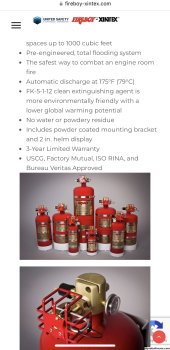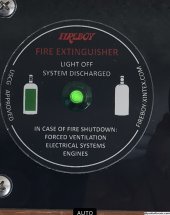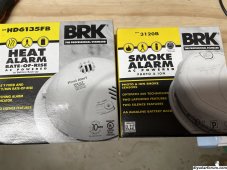KevinM
New Member
I'm glad to see there is a discussion group about this topic, some interesting comments.
My main concern having a large battery bank in an RV is obviously the failure these batteries might have. Hot fires and RVs don't mix well.
In my plan the cells will occupy their own compartment secured on aluminum shelves we will fabricate. From everything i read, basic ABC type extingushers can put out the initial flames, but the thermal reaction in the subject cells will continue for a few seconds, possibly causing it or adjacent cells to reignite. So here's what i was thinking.
1) I can install a ABC "bomb type" automatic extinguisher, like the Protang which should take care of the initial fire.
2) In order to keep the batteries cool for a few seconds I can design and fabricate a small precharged water misting system (similar to that used in most commercial buildings, but just using mist not squirting water) with a gallon or two of water in a pressurized vessel. I can design the firing system using a pico or similar with flame sensors. The misting is just intended to keep the compartment and cells cool without creating any paths for additional shorts.
3) line the compartment with a high temperature material like what is used for light weight welding blankets, typically good up to 1800 degrees.
I get that ensuring the battery system is designed and maintained properly is the best way to prevent failures, but in the real world any number of things can go wrong and ruin your whole day.
Is this crazy? A little overkill? your thoughts?
My main concern having a large battery bank in an RV is obviously the failure these batteries might have. Hot fires and RVs don't mix well.
In my plan the cells will occupy their own compartment secured on aluminum shelves we will fabricate. From everything i read, basic ABC type extingushers can put out the initial flames, but the thermal reaction in the subject cells will continue for a few seconds, possibly causing it or adjacent cells to reignite. So here's what i was thinking.
1) I can install a ABC "bomb type" automatic extinguisher, like the Protang which should take care of the initial fire.
2) In order to keep the batteries cool for a few seconds I can design and fabricate a small precharged water misting system (similar to that used in most commercial buildings, but just using mist not squirting water) with a gallon or two of water in a pressurized vessel. I can design the firing system using a pico or similar with flame sensors. The misting is just intended to keep the compartment and cells cool without creating any paths for additional shorts.
3) line the compartment with a high temperature material like what is used for light weight welding blankets, typically good up to 1800 degrees.
I get that ensuring the battery system is designed and maintained properly is the best way to prevent failures, but in the real world any number of things can go wrong and ruin your whole day.
Is this crazy? A little overkill? your thoughts?







